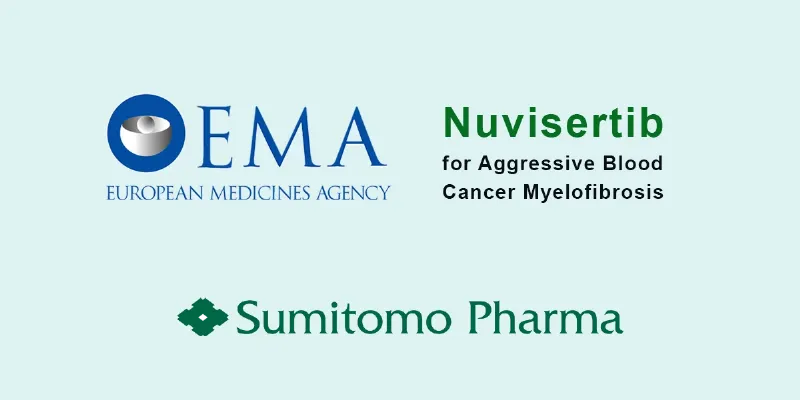EMA Grants Orphan Drug Designation to Nuvisertib for Rare Blood Cancer Myelofibrosis

30 July 2025
Nuvisertib, an oral PIM1 kinase inhibitor from Sumitomo Pharma, has received Orphan Drug Designation from the EMA for treating relapsed or refractory myelofibrosis—a rare blood cancer. Backed by preclinical efficacy and a Phase 1/2 trial, the drug also holds FDA Fast Track and Orphan status, underscoring its potential in a high-unmet-need population.
An investigational oral therapy, nuvisertib (TP-3654), developed by Sumitomo Pharma America, has been granted Orphan Drug Designation by the European Medicines Agency (EMA) for the treatment of relapsed or refractory myelofibrosis—a rare and aggressive bone marrow cancer with few effective options in later stages. The designation highlights growing interest in novel approaches targeting this difficult-to-treat malignancy.
"Following the recent FDA Fast Track Designation, being granted Orphan Drug Designation from European regulators emphasizes the potential of nuvisertib as a future option for patients living with myelofibrosis," said Dr. Tsutomu Nakagawa, CEO of SMPA. "As we pursue our mission of addressing unique and unmet patient needs, we look forward to working with the EMA to advance the clinical development of nuvisertib."
A Rare and Challenging Disease
Myelofibrosis affects approximately 1 in 500,000 people worldwide. The disease arises from dysregulation in the JAK-STAT signaling pathway, leading to abnormal proliferation of bone marrow cells and the replacement of healthy marrow with fibrotic tissue. Clinically, it often presents with splenomegaly, severe fatigue, anemia, and low platelet counts. Despite current treatments, most patients eventually relapse or fail to respond.
"Patients living with incurable blood cancers like myelofibrosis continue to face limited treatment options, particularly in the relapsed or refractory setting," said Professor Francesco Passamonti, Head of Department of Oncology and Hematology, University of Milan. “The orphan drug designation for nuvisertib underscores its potential and the urgent need for new therapeutic approaches to a difficult to treat disease.”
Targeting PIM1: A Novel Approach
Nuvisertib represents a shift in strategy by targeting PIM1 kinase—a protein involved in cell survival and proliferation, particularly in the context of oncogenic mutations such as JAK2 V617F. In preclinical models, nuvisertib has demonstrated both antitumor and antifibrotic activity. It promotes apoptosis in mutated hematopoietic cells and, when used alone or with ruxolitinib, has been shown to normalize white blood cell counts, shrink spleen size, and reduce bone marrow fibrosis in murine models.
The drug is currently being assessed in a global Phase 1/2 clinical trial (NCT04176198) enrolling patients with intermediate- or high-risk MF who have relapsed after—or are ineligible for—standard therapies.
Global Recognition
Nuvisertib’s designation by the EMA follows similar recognitions by U.S. and Japanese regulatory bodies. The FDA granted orphan drug status in 2022 and fast track designation in June 2025. Japan’s Ministry of Health followed suit in late 2024.
While still early in clinical development, nuvisertib is emerging as one of the more closely watched candidates in the MF treatment landscape. Its dual antifibrotic and pro-apoptotic mechanisms may offer a complementary or alternative approach to current JAK inhibitors, which remain the standard of care but often fail to deliver durable responses in advanced disease.











Comments
No Comments Yet!